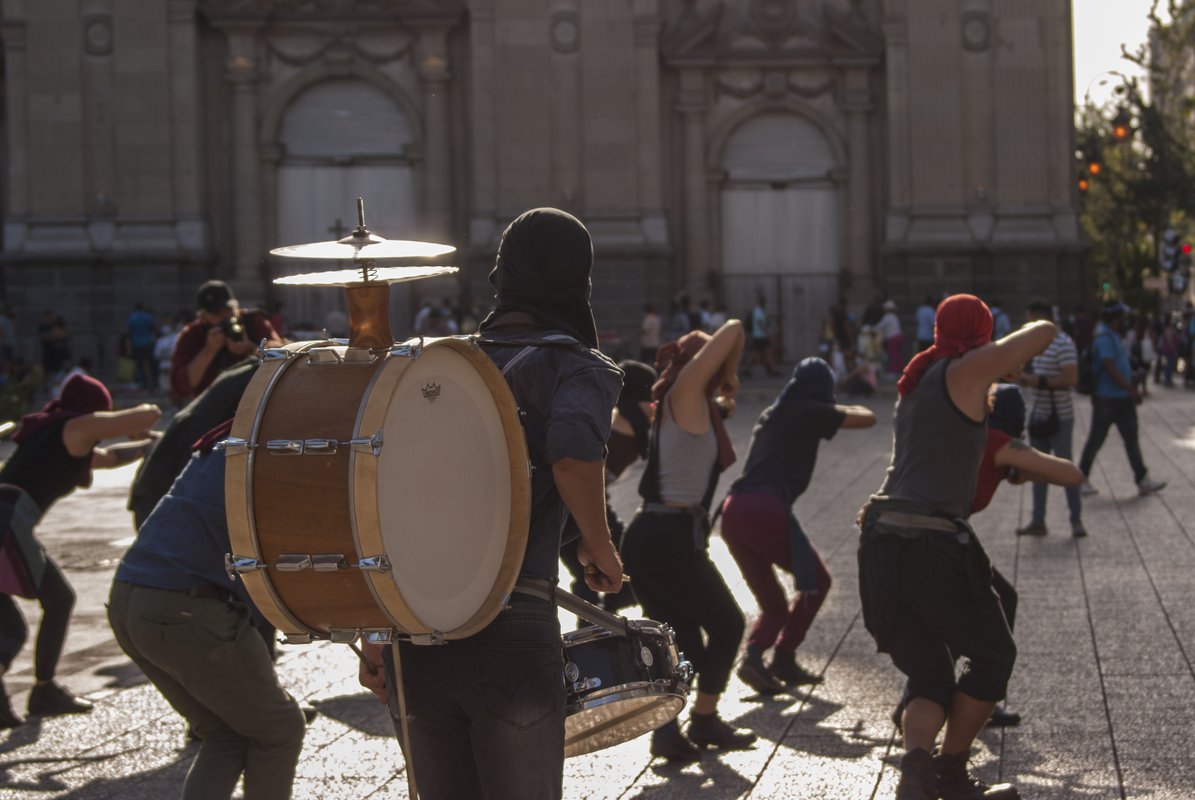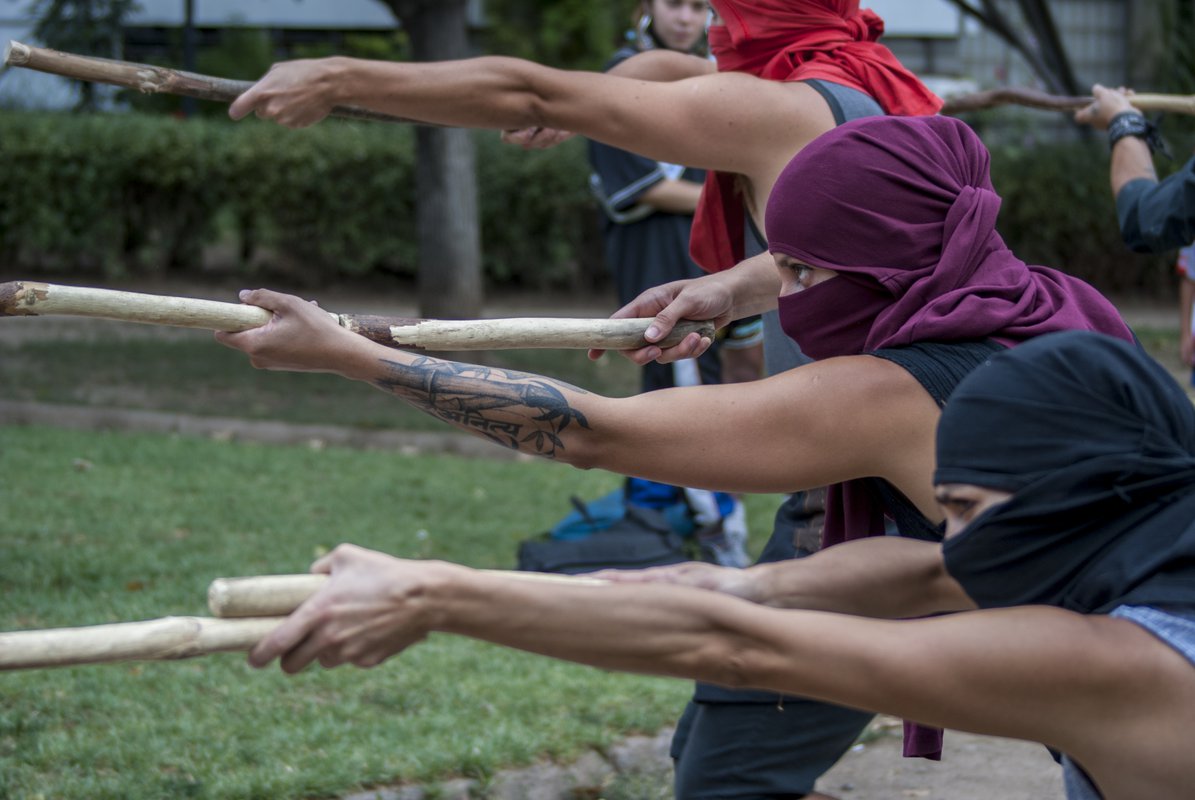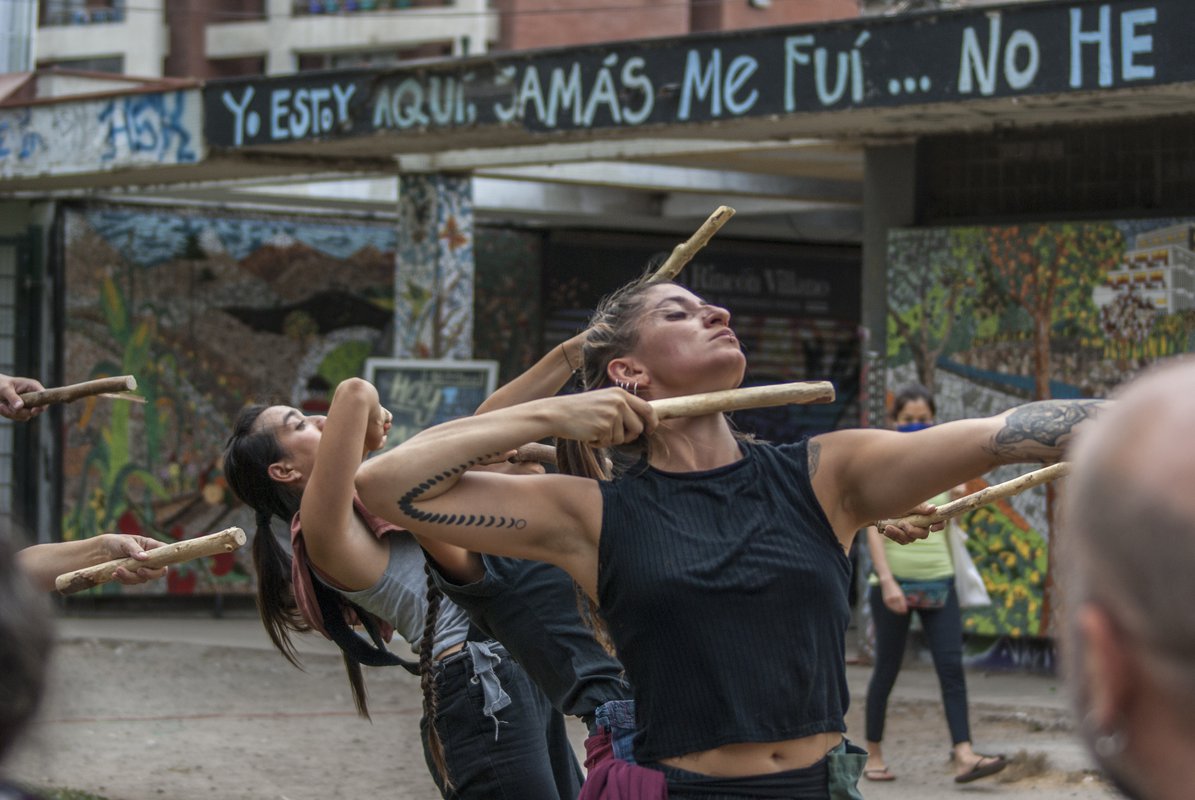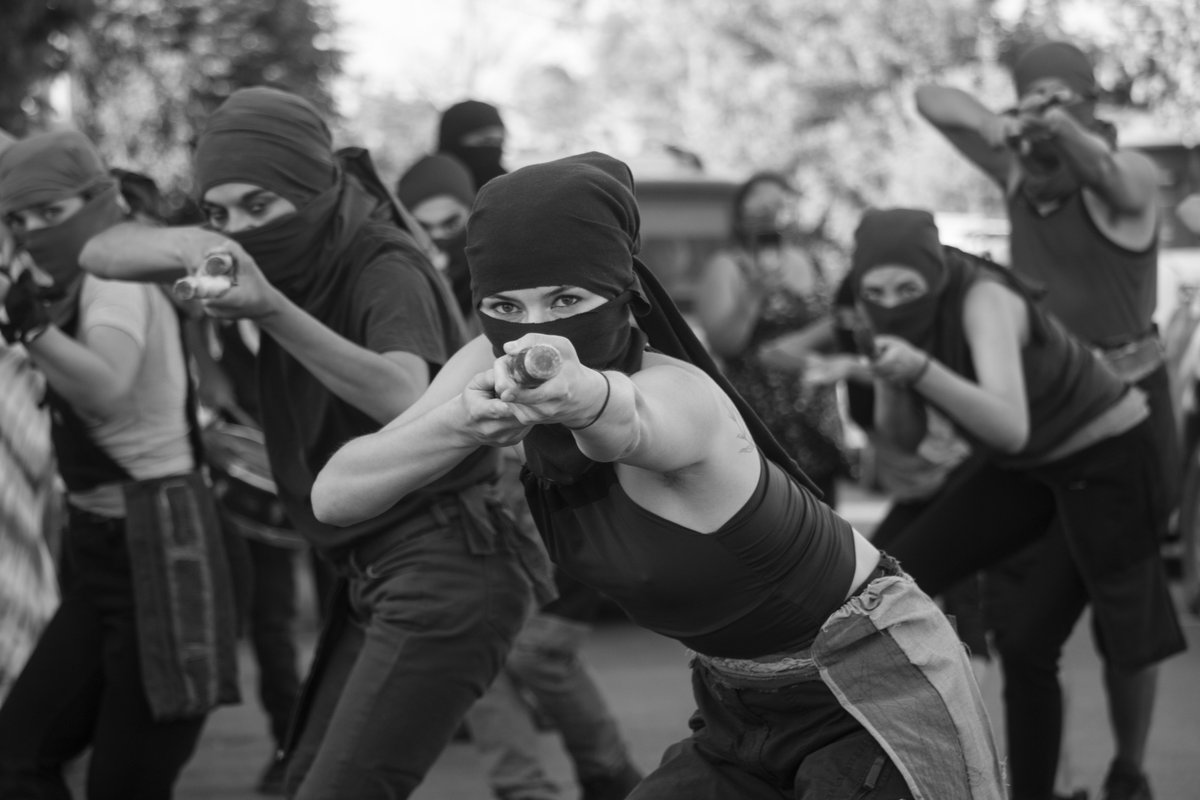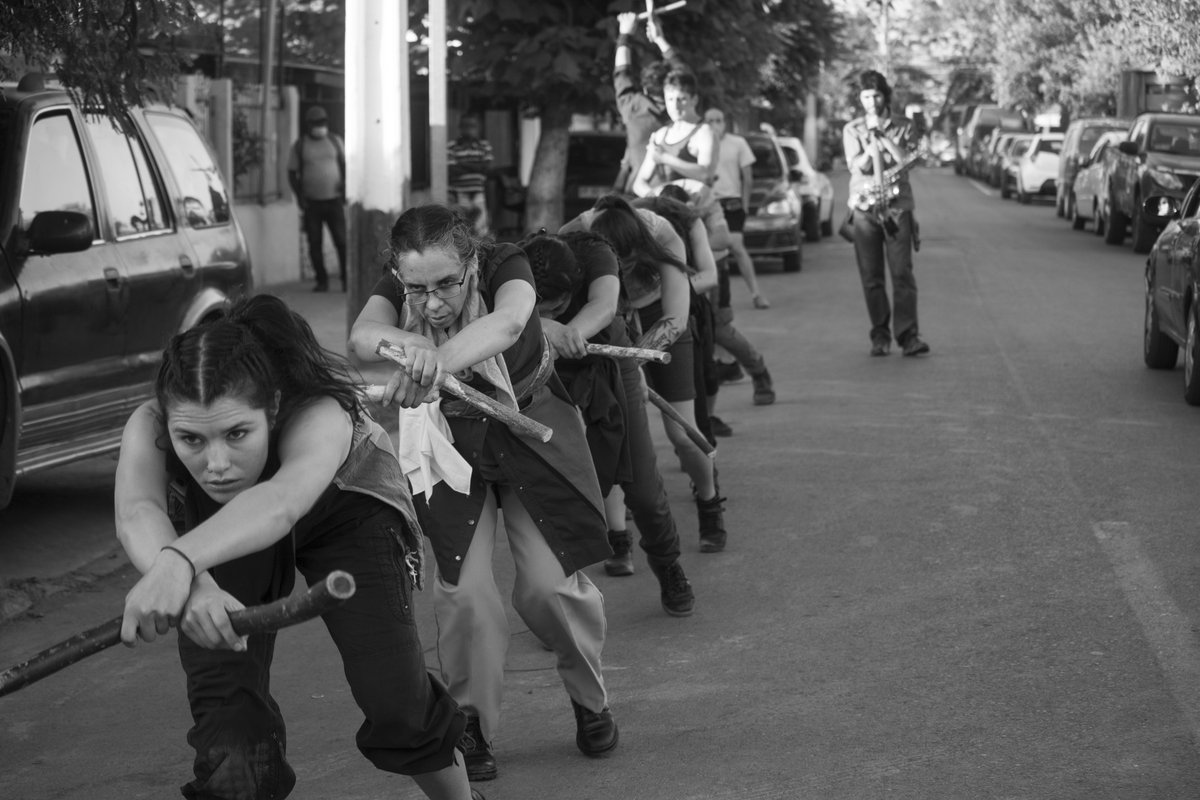Street Theater
Director: Fabián Sáez Maldonado | Producer: Raisa Ganter Araya | Performers: Raisa Ganter Araya, Rodrigo Alvayay Inostrosa, Ximena Sheila Concha, Carolina Rodríguez Pinto, Claudia Munzenmayer Vega, Nicolás Godoy Olave, Luis Felipe Chávez Sáez, Elena Orueta Castro, Javiera Arancibia Vicuña | Musicians: David Pérez Rada, Matías Baeza Miranda | Designer: Catalina Salas Méndez
Fabián Sáez Maldonado
Director
Acting, Directing, Teaching
Fabián is an actor and holds a degree in Scenic Studies from the Universidad Mayor. He has worked as a performer in several national and international companies, such as La Rueda Coja, La Patriótico Interesante, La Difunta Teatro, Teatro La Criatura, Teatro del Silencio and LabPerm, among others. He has also participated in projects and internships in Italy and Turkey.
He is currently director of the company Laburatorio Teatro, from where he has led five productions and 28 training processes related to street theater in Chile, Uruguay and Mexico.
Laburatorio Teatro
The company
A Breeding Ground for Street Theater
This street theater company began its work in 2014, conforming itself as a laboratory for research, training and creation in street theater based on the intervention of public and private spaces. Live music plays a fundamental role in their work, especially their original songs, written by the company itself. The company premiered, so far, five productions and has also applied its research in 28 formative and creative processes open to the community, both in Chile and abroad.
-Because it is a production that seeks to refresh the historical memory of the repression and extermination suffered by the Chilean people, workers and organizations throughout the country's history. The company also wants to highlight the abuse that powerful groups exert over society, "and how the Chilean State and the church defend the economic interests of these groups, leaving aside the welfare of an entire country".
-Because the play, due to its nature -being a street performance-, manages to establish a deep connection with the audience from the very essence of theater, without major technical devices. "It is based only on the physical skills of the actors and actresses, the live music, the choreographies and the infrastructure of the staging, the use of singing as a communication tool and the historical data given through the text, as well as some performers’ biographical experiences" the company says.
-Because within their performances there is a concrete, close and sensitive one for Chileans: the social outbreak of October 18, 2019, and its episodes of repression and death.
Street Theater: A form of theatrical representation that takes place in open public spaces, where spectators do not pay for the show and commonly attend it spontaneously. Its origins lie in ancient Greece around the 6th century BC. In its modern stage, it was born from the rejection of conventional theatrical venues, in search of an audience that does not frequent the theater as a direct socio-political action. This original ideological value meant that during the first half of the 20th century it was associated with proletarian theater. From the 60's onwards, it progressively inclined towards more aesthetic than political objectives, and in the 90's it incorporated greater lighting effects, sound and special effects.
-Watch the documentary Más cerca de la luz,, by Martín Farías, about street theater in Santiago.
On Instagram, @laburatorioteatro | @fa.ayurvedapopular | @raisaganter
On Facebook, https://www.facebook.com/fsaezmal
PRODUCE

210 Genocidio de la memoria
By Laburatorio Teatro | Directed by Fabián Sáez
- Chile
- Spanish
- 55 minutes
- + 14 years
A street montage that visibilizes the repression and violence experienced in Chile through a historical review of four of the major abuses committed in the country.
210 Genocidio de la Memoria is a street performance that seeks to visibilize the episodes of repression and constant violence experienced in Chile from 1810 -the year of its supposed independence- onwards. The company rescues four historical events in which the forces of law and order abused their power: the Selknam genocide, the workers' slaughter, the dictatorship, and the social unrest in 2019. In this performance, the concept of genocide is used as the main object of study and creation. It becomes the guiding and reflective thread proposed by the company.
Texts, songs, choreography and music are part of the staging. The fusion of historical and biographical material of the performers triggers a direct link with the audience.
210 Genocidio de la memoria
By Laburatorio Teatro | Directed by Fabián Sáez
- Chile
- Spanish
- 55 minutes
- + 14 years
A street montage that visibilizes the repression and violence experienced in Chile through a historical review of four of the major abuses committed in the country.
210 Genocidio de la Memoria is a street performance that seeks to visibilize the episodes of repression and constant violence experienced in Chile from 1810 -the year of its supposed independence- onwards. The company rescues four historical events in which the forces of law and order abused their power: the Selknam genocide, the workers' slaughter, the dictatorship, and the social unrest in 2019. In this performance, the concept of genocide is used as the main object of study and creation. It becomes the guiding and reflective thread proposed by the company.
Texts, songs, choreography and music are part of the staging. The fusion of historical and biographical material of the performers triggers a direct link with the audience.
Director: Fabián Sáez Maldonado | Producer: Raisa Ganter Araya | Performers: Raisa Ganter Araya, Rodrigo Alvayay Inostrosa, Ximena Sheila Concha, Carolina Rodríguez Pinto, Claudia Munzenmayer Vega, Nicolás Godoy Olave, Luis Felipe Chávez Sáez, Elena Orueta Castro, Javiera Arancibia Vicuña | Musicians: David Pérez Rada, Matías Baeza Miranda | Designer: Catalina Salas Méndez
Fabián Sáez Maldonado
Director
Acting, Directing, Teaching
Fabián is an actor and holds a degree in Scenic Studies from the Universidad Mayor. He has worked as a performer in several national and international companies, such as La Rueda Coja, La Patriótico Interesante, La Difunta Teatro, Teatro La Criatura, Teatro del Silencio and LabPerm, among others. He has also participated in projects and internships in Italy and Turkey.
He is currently director of the company Laburatorio Teatro, from where he has led five productions and 28 training processes related to street theater in Chile, Uruguay and Mexico.
Laburatorio Teatro
The company
A Breeding Ground for Street Theater
This street theater company began its work in 2014, conforming itself as a laboratory for research, training and creation in street theater based on the intervention of public and private spaces. Live music plays a fundamental role in their work, especially their original songs, written by the company itself. The company premiered, so far, five productions and has also applied its research in 28 formative and creative processes open to the community, both in Chile and abroad.
-Because it is a production that seeks to refresh the historical memory of the repression and extermination suffered by the Chilean people, workers and organizations throughout the country's history. The company also wants to highlight the abuse that powerful groups exert over society, "and how the Chilean State and the church defend the economic interests of these groups, leaving aside the welfare of an entire country".
-Because the play, due to its nature -being a street performance-, manages to establish a deep connection with the audience from the very essence of theater, without major technical devices. "It is based only on the physical skills of the actors and actresses, the live music, the choreographies and the infrastructure of the staging, the use of singing as a communication tool and the historical data given through the text, as well as some performers’ biographical experiences" the company says.
-Because within their performances there is a concrete, close and sensitive one for Chileans: the social outbreak of October 18, 2019, and its episodes of repression and death.
Street Theater: A form of theatrical representation that takes place in open public spaces, where spectators do not pay for the show and commonly attend it spontaneously. Its origins lie in ancient Greece around the 6th century BC. In its modern stage, it was born from the rejection of conventional theatrical venues, in search of an audience that does not frequent the theater as a direct socio-political action. This original ideological value meant that during the first half of the 20th century it was associated with proletarian theater. From the 60's onwards, it progressively inclined towards more aesthetic than political objectives, and in the 90's it incorporated greater lighting effects, sound and special effects.
-Watch the documentary Más cerca de la luz,, by Martín Farías, about street theater in Santiago.
On Instagram, @laburatorioteatro | @fa.ayurvedapopular | @raisaganter
On Facebook, https://www.facebook.com/fsaezmal
PRODUCE


